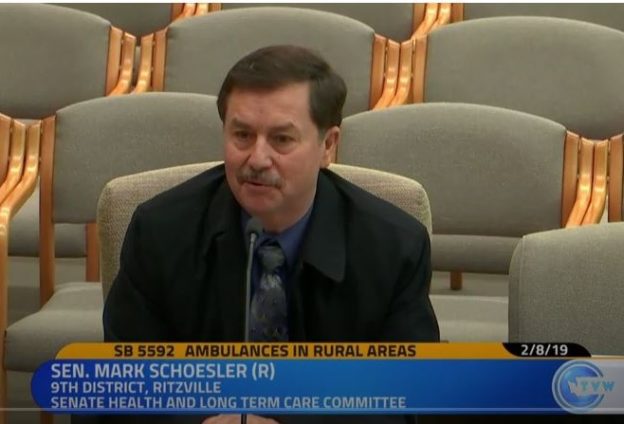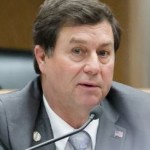When Gov. Jay Inslee announced Friday that 10 Washington counties may be allowed to partially reopen amid his stay-home order due to the COVID-19 pandemic, the 9th Legislative District team of Sen. Mark Schoesler, and Reps. Joe Schmick and Mary Dye immediately noticed Whitman County was not on the list.
The omission prompted the lawmakers to send a joint letter to Inslee yesterday, asking him to add Whitman to the list of counties that can seek a variance from the governor’s Proclamation 20-25, allowing them to reopen parts of their economies soon.
“We think the governor isn’t using fair criteria to judge which counties can partially reopen their economies during his shutdown, especially in regards to Whitman County. We think Whitman should be allowed to partially reopen now, and Representatives Schmick and Dye and I wanted to let the governor know it,” said Schoesler, R-Ritzville.
“Whitman County has two cases that are being monitored and staying home. All other cases have recovered. It makes no sense to close the county for two. The recovery numbers are not being published and I think they should be in every county. Our families, small businesses and employees want – and need – to get back to work. I trust our citizens to be smart, deliberate and thoughtful of others as we emerge from quarantine,” said Schmick, R-Colfax.
“We have had weeks to better understand the nature of the pandemic. It is self-evident that we must protect vulnerable elderly populations in assisted living and nursing homes,” said Dye, R-Pomeroy. “Our communities in Whitman County need to be freed from the governor’s restrictions in order to save our rural hospitals and our rural economy. We are better able to respond to the virus when our communities are allowed to recover financially as well.”
The 10 counties that can partially reopen are Columbia, Ferry, Garfield (which is in the 9th District), Grays Harbor, Jefferson, Kittitas, Lincoln, Pend Oreille, Skamania and Wahkiakum.
The text of the 9th District legislators’ letter to the governor is below:
May 5, 2020
Governor Jay Inslee
PO Box 40002
Olympia, WA 98504-0002
Dear Governor Inslee,
We are writing to respectfully ask you to add Whitman County to the list of Washington counties that may seek a variance from your Proclamation 20-25, toward reopening parts of their economies sooner.
We are encouraged by your recognition of the fact that not all areas of the state are experiencing the COVID-19 pandemic in the same way and agree with you that some counties should have an opportunity to reopen earlier. However, we are disappointed to learn of the disclosed criteria that lead to inclusion of some counties while excluding Whitman County: Counties under 75,000 in population are eligible to apply for a variance if they have not had a single positive COVID-19 case in the last three weeks. (We were told Whitman County had none over the last week, but had one the prior week, so it needs to go two more weeks without a positive test.) We think this is the wrong criteria to use and we are disappointed Whitman County is not being given that opportunity – because the data indicate it should.
For instance, Jefferson County made the list despite having had twice as many confirmed cases (28) of COVID-19 as Whitman County (14). (According to the Whitman County Health Department, there currently are two active COVID-19 cases in this county, as the others diagnosed with it have recovered.) Grays Harbor County is on the list despite having a population roughly 50 percent greater than Whitman County. Kittitas County is eligible despite having a slightly higher rate of confirmed cases per 1,000 people (0.30) than Whitman County (0.28). In fact, Whitman County has the 11th lowest rate of confirmed cases per 1,000 people of all 39 counties in our state. It is also noteworthy that Whitman County, like all of the 10 counties being allowed to seek a variance, has had no deaths caused by the COVID-19 outbreak.
We also note that with Washington State University having canceled in-person classes for the rest of the current academic year, Whitman County’s largest city, Pullman, is now home to only a small fraction of the student body. Forcing many Pullman businesses to remain closed for several more weeks at a time when they prematurely find themselves with far fewer customers to protect will needlessly bring them closer to the edge of failure.
It’s worth noting that Whitman and other border counties have faced very tough stay-home restrictions over the past several weeks, while our neighbors in Idaho have endured far fewer restrictions. Unlike in Washington, you can buy a car in Idaho, which seems like a very reasonable and sensible approach considering auto dealerships typically have very few customers in the building at the same time. Outdoor activities like golf, which by its very nature employs physical distancing, have been handled far differently in Washington than in Idaho. While you can play golf in Lewiston, you haven’t been allowed to play it in Clarkston, even though the two towns are just across the river from each other. At least you are finally somewhat relaxing your shutdown on golf and other outdoor activities.
During your Friday announcement that Proclamation 20-25 would be extended, you spoke of your desire to bet on success rather than failure. We would bet that if Whitman County is granted the same opportunity as the 10 counties you designated already, its leaders, merchants and residents will deliver. It would be fair and consistent – and they, too, would rather succeed than fail.
Please reconsider your decision and allow Whitman County to also apply for a variance so it can finally, if slowly, start its reopening process.
Sincerely,
MARK SCHOESLER
State Senator
9th Legislative District
JOE SCHMICK
State Representative
9th Legislative District
MARY DYE
State Representative
9th Legislative District
Cc: Whitman County Commissioners
Art Swannack, District 1
Dean Kinzer, District 2
Michael Largent, District 3













